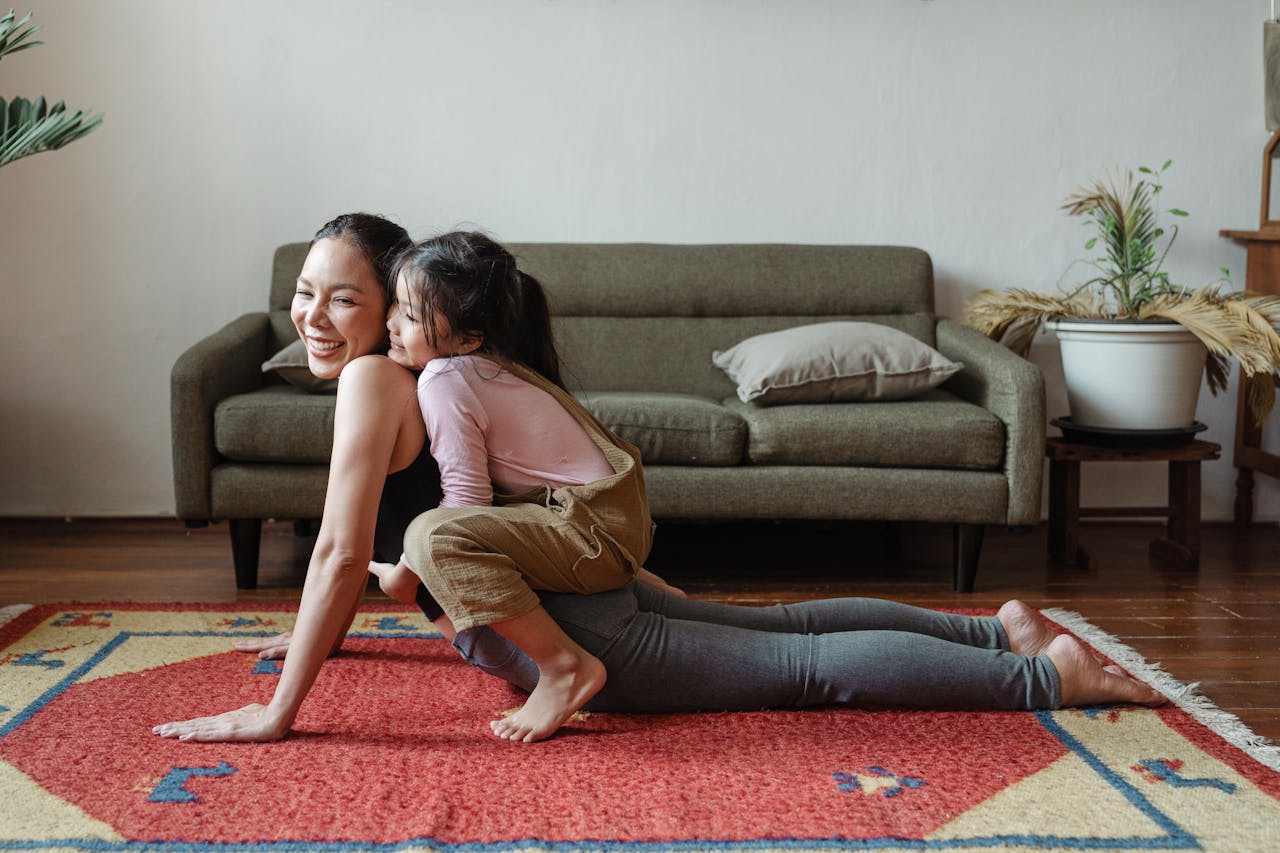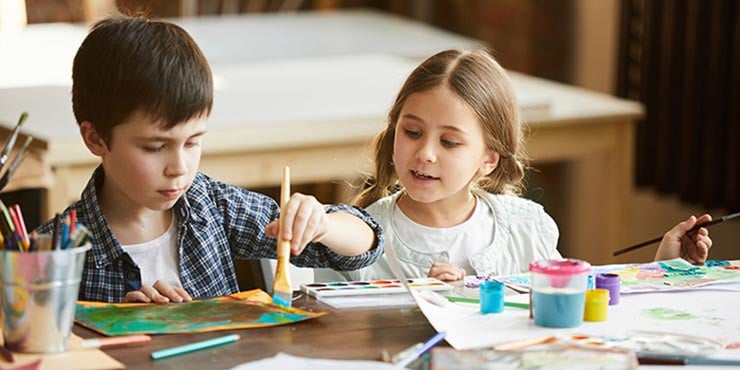5
Mindfulness for Kids
Last Updated: November 4, 2024

Table of Contents
If you are trying to become a more active parent, be more involved in your child's development and wellbeing, then you should definitely read this!
Key Takeaways
- Mindfulness improves focus: To teach mindfulness to elementary school students can enhance attention, helping them stay focused during tasks.
- Reduces stress: Mindfulness practices, such as mindful breathing and taking deep breaths, allow kids to manage stress better and regulate emotions.
- Promotes happiness: To teach kids mindfulness encourages emotional well-being and joy.
- Supports mental health: A mindfulness program can help with managing anxiety and improve overall mental health, especially in developmental psychology contexts.
- Fosters family peace: Practicing mindfulness as a family benefits household harmony.
If your child is struggling with stress, anxiety, chronic worrying, or related symptoms, mindfulness is a practice that can help, especially mindfulness activities.
When teaching mindfulness, adults and kids require a different approach. But before stepping into practical tools and mindfulness exercises for young kids and teens, let’s define what mindfulness is about and what it means for young children.
What Is Mindfulness For Kids?
 It can be challenging to define mindfulness in just one sentence. There are simply too many definitions out there. For kids, however, it’s best to simplify the explanation as much as possible.
It can be challenging to define mindfulness in just one sentence. There are simply too many definitions out there. For kids, however, it’s best to simplify the explanation as much as possible.
If you’d like to explain what mindfulness is to your child, we invite you to use a definition such as this one:
Mindfulness Means Slowing Down Your Thinking
When you are mindful, you put all of your attention and focus on what is happening right now, at this exact moment.
You don’t think about what you had for breakfast this morning or the funny thing you said to your friends earlier in the day. Don’t think about the homework you’ve got to do later this evening or how you’re looking forward to the weekend.
With mindfulness, you do nothing else but focus on the moment right now. To do this, you can use many different techniques. For example, you can focus on your belly breathing bodily sensations, notice every thought that crosses your mind or say a “mantra” (favorite phrase) to yourself.
Why Do Kids Need Mindfulness?
Approximately 4.4 million American children aged 3-17 have been diagnosed with anxiety.
If you’re wondering about the benefits of mindfulness for kids, here are just a few you can expect. Meditation for kids can:
1. Help them avoid distractions
Kids are often easily distracted. Mindfulness improves focus. This allows them to complete tasks more efficiently and with greater overall ease. Whether it’s paying attention at school, learning to listen carefully during class or even addressing ADHD – attention deficit hyperactivity disorder – mindfulness is a powerful tool to help a child stay present and reduce mind wandering.
2. Promote joy
Mindfulness allows kids to open their hearts and minds, which naturally promotes more joy and happiness. Raising children with a sense of joy is essential for the healthy development of the nervous system and, with the help of mindfulness work, can be achieved and maintained from early childhood.
3. Teach them how to deal with stress
Often, kids head into their teenage and young adult years without the tools they need to handle stress. Stress can manifest itself in different ways, shapes, and sizes – the absence of focus, difficulty with emotional regulation, depression, lack of joy, and curiosity.
Mindfulness is a great practice to help handle stressful times because it slows down your mind and body simultaneously. By focusing only on the present moment, rumination isn’t possible. Furthermore, if you can harness and calm your thoughts, you can also slow your heart rate and reduce heavy, fast breathing and other physical symptoms of stress.
Stress reduction in everyday life should be high on priority lists for parents and tutors to teach children. The reality of current times is that children are constantly exposed to stressors and are not presented with tools to navigate stress. Mindfulness education is an effective way to help young kids to manage stress.
4. Foster peace and calm at home and in your family life
Lastly, teaching your children mindfulness can help you keep your home calmer and more peaceful as a parent. Children who understand and practice mindfulness regularly tend to be more relaxed. They can cope with stressors and challenging situations much better. This can help release the pressure valve in an otherwise stressful household, calming fights before bed or naptime, lessening trouble at the dinner table, and limiting other snafus that frequently come with parenting.
Tips for Teaching Kids Mindfulness
Feelings come and go like clouds in a windy sky. Conscious breathing is my anchor.
— Thich Nhat Hanh
Sharing mindfulness with your children can be a great way to connect positively and help them achieve a calmer state of mind.
Here are some tips for helping your children learn mindfulness:
Promote mindfulness as a tool for complicated feelings and emotions.
As adults, we know how difficult controlling our emotions and feelings can be. But we also know we’re a lot better at it than we were when we were kids. When you’re young, strong emotions like fear, worry, and anger can come on like insurmountable tsunamis, and it can seem like there’s no way out.
Teaching mindfulness to your child can help them learn that complicated feelings and emotions don’t have to be in charge. With mindful breathing and practice focusing on just one thing, your child can learn to harness their thoughts and let worry and anxiety float away.
Incorporate physical activity.
Especially active kids will benefit from incorporating physical activity with mindfulness. After all, even for adults, it can be challenging to sit in mindful meditation. Practicing mindfulness while being active, go for a mindful walk, play a silent game of ping pong, or try some mindful yoga together.
Use mindfulness techniques to explore nature.
Nature is the perfect place for mindfulness practice. For example, you can go for a mindful hike, do some mindful gardening, or just sit in a beautiful spot and do a bit of mindfulness meditation.
Show them that you are also practicing mindfulness.
Practicing what you preach when it comes to mindfulness is critical.
Try our quick and straightforward Unwind Your Mind session to start your mindfulness training. You’ll stream live with a professional meditation instructor who can help you relax, reset, and learn the basics of mindfulness in just 25 minutes.
Meditation For Children
Kid's meditation is another way for children to practice mindfulness. For your child to feel more mindful, it's essential to introduce them to elements they feel comfortable with and perhaps something you could practice together. Mindfulness meditation for kids practiced alongside you as a parent will engage your child and make them more at ease with the entire process.
Mindfulness for children is essential for their wellbeing, and the sooner you can start, the better they will feel. Mindful kids are happy kids, and with happy children, you will have satisfied parents. Several mindfulness articles promote mindful meditation for kids.
If you are looking for mindfulness meditation for kids, please feel free to reach out to one of our Wellness advisors to discuss your needs and goals.
Mindfulness for Kids Frequently Asked Questions
Is mindfulness meditation good for kids?
Yes! Mindfulness is the perfect activity for kids of any age, no matter their personalities or interests. Teaching your children mindfulness can help them throughout their lives. It teaches them how best to deal with stress, concentrate on one task, and enjoy the present moment without ruminating on the past or future.
What activities support mindfulness?
You can do any activity with mindfulness. For example, you can sweep the floor, weed the garden, or clean your bedroom with mindfulness. All you need to do to be mindful while doing another task is to focus on what you’re doing and try not to let your mind wander to the future or past. An excellent way to do this is to note every movement you make and every thought that crosses your mind. Describe to yourself what you are doing in explicit detail. When you’re not doing anything or not moving at all, simply focus on your breath.
What are mindfulness skills?
Like math, reading, or playing the guitar, learning mindfulness is a skill. Through repetition, you can learn how to practice mindfulness (and get better at it). Practicing every day is the best way to attain the skill of mindfulness.
With Mindfulness Practice, Kids Should Start Young
If you’ve used mindfulness to improve your own life, you already know this practice’s amazing benefits. Teaching your children the practice at an early age can help them grow into mindfulness and use it throughout their lives.
Where to start? Try our Unwind Your Mind streaming service. Through personalized instruction, your child can learn to use breathing and mindful focus to slow down frantic thinking and anxiety.
Mindfulness is a tool anyone can take advantage of, but the Unwind Your Mind service is unique to Anahana. Try it with your child today and start to see positive benefits right away.

References
https://www.cdc.gov/childrensmentalhealth/data.html
https://www.ncbi.nlm.nih.gov/pmc/articles/PMC6088366
Disclaimer
The contents of this article are provided for informational purposes only and are not intended to substitute for professional medical advice, diagnosis, or treatment. It is always recommended to consult with a qualified healthcare provider before making any health-related changes or if you have any questions or concerns about your health. Anahana is not liable for any errors, omissions, or consequences that may occur from using the information provided.

Dr. Darlene Buan-Basit is a highly experienced licensed Chiropractor and Pilates instructor with expertise in many techniques, including Medical Acupuncture, Traditional Chinese Medicine, and Advanced Massage Techniques.
.jpg?width=740&name=two-children-relaxing-on-the-couch-enjoying-mindfulness-for-kids-700(1).jpg)